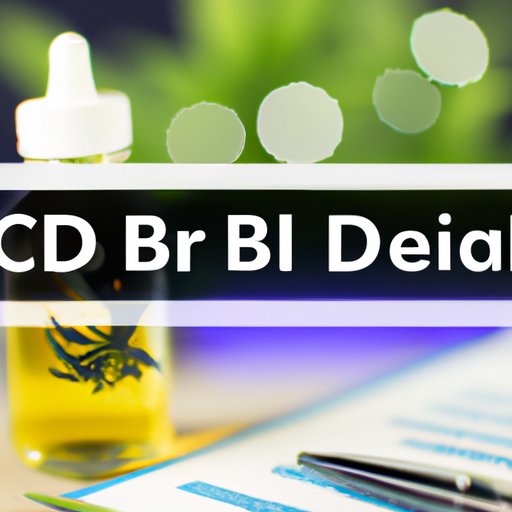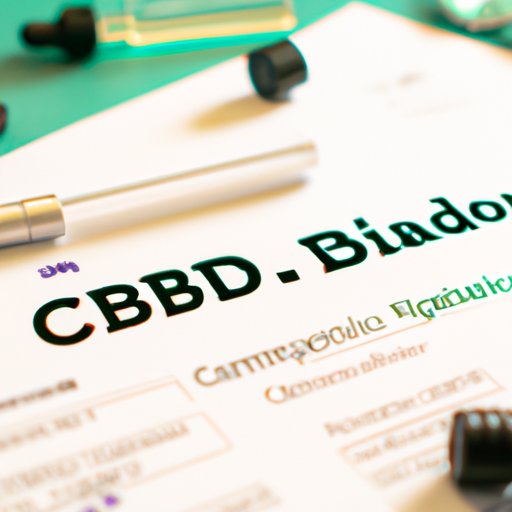Is CBD Federally Legal? A Comprehensive Guide to Understanding the Legal Status of CBD
Cannabidiol, more commonly known as CBD, has been steadily growing in popularity in recent years. With claims of numerous health benefits, including its ability to reduce anxiety and relieve pain, many people have turned to CBD as an alternative to traditional medicine. But despite its popularity, there is still a lot of confusion about the legality of CBD, especially at the federal level. In this article, we will explore the complex legal landscape of CBD and provide a comprehensive guide to understanding its federal legal status.
A Comprehensive Guide to Understanding the Legal Status of CBD on a Federal Level
CBD is a non-psychoactive compound found in the cannabis plant. Unlike tetrahydrocannabinol (THC), the compound in marijuana that causes a “high,” CBD does not produce any intoxicating effects. This means that CBD does not make you feel “stoned” or “high.”
The key difference between CBD and marijuana is the concentration of THC. Marijuana is defined as cannabis that contains more than 0.3% THC by weight, while CBD products contain less than 0.3% THC. This critical difference is what makes CBD legal on a federal level, as we will explore in more detail below.
Relevant federal laws and regulations, such as the Controlled Substances Act, have long classified cannabis as a Schedule I drug, meaning that it is considered to have no accepted medical use and a high potential for abuse. This classification has historically put marijuana and CBD in the same category as highly addictive drugs like heroin. However, the 2018 Farm Bill, which was signed into law in December 2018, removed hemp and all its extracts, including CBD, from the Controlled Substances Act’s definition of marijuana.
Navigating the Complexities of CBD Legality: What the Federal Government Says
Several federal agencies are involved in regulating CBD, including the Food and Drug Administration (FDA), the Drug Enforcement Agency (DEA), and the Department of Agriculture (USDA).
As of now, the FDA has only approved one CBD product for medicinal use – Epidolex, a pure form of CBD used to treat seizures associated with two rare forms of epilepsy. The agency has not approved any other CBD products for any specific medical condition, nor has it established any regulatory framework for CBD products marketed as dietary supplements or food additives. However, the FDA has stated that it is “actively considering” pathways for the lawful marketing of CBD products.
In 2018, the DEA rescheduled FDA-approved drugs containing CBD with no more than 0.1% THC from a Schedule I drug to a Schedule V drug, which is the lowest possible classification for a controlled substance. This action effectively made it easier for doctors to prescribe drugs that contain CBD to their patients.

CBD and the Law: What You Need to Know About Federal Legalization
It is important to understand the difference between federal and state laws regarding CBD. While hemp-derived CBD is legal at the federal level, some states have their own laws and regulations regarding CBD. Some states have legalized CBD and marijuana for both recreational and medicinal use, while others have stricter regulations in place.
Recent lawsuits related to CBD and federal legality have challenged the FDA and DEA’s authority over the regulation of CBD. In one case, a company sued the DEA over a raid on its facilities that resulted in the seizure of hemp plants. The company argued that the plants were legal under federal law because they contained less than 0.3% THC. In another case, a group of hemp farmers sued the USDA over new rules that they claimed could lead to violations of their constitutional rights.
There is also a legal gray area surrounding certain CBD products, such as edibles. While hemp-derived CBD is legal, the FDA has not approved CBD as a food additive, meaning that it is technically illegal to sell food products that contain CBD. However, some states have legalized CBD-infused food and drinks, resulting in confusion for both consumers and law enforcement.

The Legality of CBD: A Federal Perspective
The federal government’s current stance on CBD is a significant departure from past attitudes towards marijuana. While cannabis has been demonized and criminalized for decades, the legalization of hemp and CBD shows that the government is starting to recognize the potential benefits of cannabis compounds.
However, the political debates surrounding CBD legalization remain contentious. While some politicians and advocacy groups have pushed for more comprehensive legalization of CBD and marijuana, others have expressed concerns about potential safety risks and the impact of legalization on society.

Breaking Down the Latest Federal Regulations on CBD
There have been several recent federal bills related to CBD legalization, including the Hemp Farming Act of 2018 and the MORE Act of 2020. These bills have proposed more comprehensive legalization and regulation of CBD and marijuana at the federal level.
In terms of regulations, the FDA’s regulatory process for CBD products focuses on ensuring that they are safe and effective for their intended use. This process typically involves preclinical and clinical testing, as well as manufacturing controls and labeling requirements.
The State of CBD: Examining its Legal Status on the Federal Level
Overall, CBD is legal at the federal level, but its legal status is still complex and evolving. While hemp-derived CBD is legal, the regulatory framework surrounding CBD products can be confusing for consumers and businesses alike.
The legal status of CBD has had a significant impact on the industry and consumers. With increased accessibility and legalization, CBD has become a significant driver of growth in the health and wellness market, and more and more people are turning to CBD for relief from a variety of conditions. However, the lack of clear regulations and guidelines can make it difficult to navigate the market safely and responsibly.
Conclusion and Final Thoughts
CBD’s federal legal status is complex and evolving, but it is essential to understand the current legal landscape to make informed decisions about CBD products. While federal legalization of CBD has opened up new opportunities for consumers and businesses alike, it is critical to remain aware of the potential risks and uncertainties surrounding CBD, including the lack of regulation and the legal gray area surrounding certain products. Ultimately, CBD’s legal status will continue to be a topic of debate and discussion in the coming years, challenging policymakers, regulators, and consumers to navigate the complexities of a rapidly growing industry.
